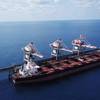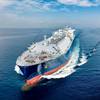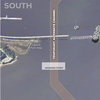The International Bunker Industry Association (IBIA) was told at its annual convention in Montreal this month that a new report estimates that it would cost $67b over the next five years to implement a wholesale switch from traditional bunker fuels to distillates only for the world merchant fleet. The distillates-only option was also described as “unfeasible”, due to lack of sufficient refining capacity.
The report, prepared for the American Petroleum Institute (API) by EnSys Energy & Systems Inc and Navigistics Consulting, highlights the considerable costs of meeting possible stricter air emissions regulations imposed by a revised MARPOL Annex VI and, in particular, the huge costs and increased CO2 production entailed in implementing the switch to distillate fuel which has been proposed by, among others, Intertanko.
Speaking at the IBIA Convention in Montreal, Michael Leister, Manager of Fuels Technology for Marathon Petroleum Company and chair of the API Fuels Committee, said the results of the report are likely to be highly influential, coming just as the IMO group of experts works on its recommendations for the revision of Annex VI.
The study notes that any changes to bunker fuel specifications are very expensive and very energy-intensive, and Michael Leister told the IBIA meeting, “While some emissions may be lowered, CO2 emissions are likely to increase,” stressing that an increase in sulphur reductions results in exponential and not linear increases in costs and energy use.
The report also found that using the SECA approach to lower emissions in the areas that have a demonstrated need is much more cost-effective than changing all bunker fuel, and noted that results suggest a large incentive for ship-board solutions. It concluded that following the Intertanko option would increase refinery and global CO2 emissions, would be very expensive as a result of major refinery investment and large marine fuelling cost increases, would be very energy-intensive and would require significant additional overall refining capacity to avoid supply shortages. Further, it concluded that making the required refinery changes by 2012 was not feasible.
Converting to distillate fuel would cost $67bn by 2012 and $126bn by 2020 and increase marine fuel costs by a third by 2020. The option would involve a net increase of marine bunker fuel-related CO2 emissions of between 1.7 and 6 per cent, depending on assumptions relating to the use of coke in the process.
A combination of low-sulphur heavy fuel oil, distillate fuels, alternative fuels and emission abatement equipment such as scrubbers will together give the shipping industry the means to cut emissions without compromising safety and efficiency.”
Michael Leister formed part of an outstanding panel of experts debating environmental issues at the IBIA Convention. Chaired by BP Marine Director Don Gregory, the panel also included Niels Bjorn Mortensen, head of the marine department at BIMCO, Joseph Angelo, deputy managing director of Intertanko, Pedro Miguel Martinez Sanchez, products research manager at CEPSA, and IBIA secretary-general Ian Adams.
The convention itself was a great success, with delegates from all over the world debating commercial, legal, operational and environmental issues. Frances Keeler, Of Counsel to the California law firm Keesal Young Logan, and a former environmental regulator, delivered the keynote address to the convention, at which members voted in favour of revamping the IBIA constitution and structure to position the organisation as “the international body representing all stakeholders in the marine fuels industry”. Under the new constitution, which is expected to take about twelve months to implement, IBIA’s mission statement will be, “To be a focal point of leadership, influence and representation for the marine fuels industry.”
Subscribe for
Maritime Reporter E-News
Maritime Reporter E-News is the maritime industry's largest circulation and most authoritative ENews Service, delivered to your Email five times per week










